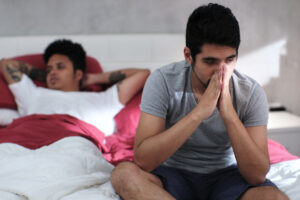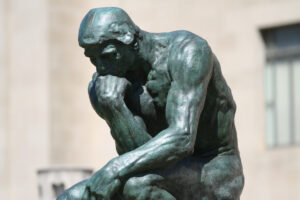
Gay Men Coping with ED: The Emotional, Physical, and Interpersonal
I have had the pleasure lately of many gay men seeking out sex therapy or life coaching services who are seeking to improve their quality of life via improving the quality of their sex life. And they improve the quality of their sex life by way of addressing the most common issue I hear about, Erectile Dysfunction (ED). However, not all of them “cure” their ED; the “answer,” if there is one (and there is more than one), is learning to cope with it by way of coming to understand it from multiple points of view.
In my sessions with clients, I have noticed I am usually responding to their concerns/complaints about ED in one of several large categories: the Emotional, the Physical, and the Interpersonal. I would add to this about the Cultural, as well, such as their nationality, ethnicity, and certainly the religion they were raised with. Another huge factor is how their being gay was responded to in their Family of Origin in their personal history (which I assess in the first couple of sessions).
 Who Am I?
Who Am I?
For those of you new to my blog articles or podcast show, I am Ken Howard, LCSW, CST, a Licensed Clinical Social Worker in California, and an AASECT-Certified Sex Therapist. I have over 29 years of experience as a gay men’s specialist psychotherapist, as well as life, career, relationship, and executive coach. I keep busy. I’m also a former Adjunct Associate Professor of Social Work at the University of Southern California (teaching psychotherapy theory, couples therapy, and an LGBT course), expert witness on LGBT/HIV issues, novelist, and composer/lyricist. So, my perspective in helping gay men with this comes from many years working with gay men’s mental health, well-being, and sexuality. I work with individuals, couples, and polyamorous polycules, originally at the height of the AIDS crisis (because, as I say, I’m just old) and then in private practice in Los Angeles. Later, I branched out to provide life, career, relationship, and executive coaching for guys all over the USA and the world. So, I’ve heard a lot of “concerns”, let’s say, that affect gay men’s subjective quality of life by way of a sexual expression. I help them in ways that point up the Six Principles of Sexual Health (my article on that is here). So it is with that perspective that I share these larger categories for thinking of the multifactorial contributions to ED, and, of course, how to address them. Let’s look at each of these influences, in turn:
Multisystemic Contributors to ED
One of the many challenges about ED is that I really don’t think it has any one cause, usually. Just as certain injuries might affect different parts of the body, “arriving at” a state of less-than-satisfying or less-than-functional erections in sex can be influenced by different factors, and by varying degrees of impact. Reversing their impact, or coping with them, means parsing out the different influences, and developing adaptive coping strategies for each one.
 Emotional – When a guy isn’t feeling his best emotionally, it can manifest by way of his penis. The classic one we can all guess is probably depression, because depression can have a big impact on reducing your sexual quality of life. You’re just not that “into it,” just like you might have a loss pleasure (“anhedonia”) in other interests in life. Or, anxiety. Many guys report that they “get in their head” with anxiety about “performing” sexually, as if sex was a command performance for which they were being watched and evaluated, with either reward or punishment as a result. Anger can be another factor, in that it can be difficult to become aroused/erect for a partner that you’re angry, frustrated, or resentful with. Stressed out is also a classic state that will undermine erectile functioning, such as a busy job, an unsafe or unhappy living environment, financial pressures, job loss, or abuse (by a partner, boss, or coworker). It can also be about reacting to a more global stressor, such as an economic recession or the COVID pandemic. Irrational fears or phobias, such as a fear of HIV or other STI contagion, beyond what’s reasonable, are also in that mix.
Emotional – When a guy isn’t feeling his best emotionally, it can manifest by way of his penis. The classic one we can all guess is probably depression, because depression can have a big impact on reducing your sexual quality of life. You’re just not that “into it,” just like you might have a loss pleasure (“anhedonia”) in other interests in life. Or, anxiety. Many guys report that they “get in their head” with anxiety about “performing” sexually, as if sex was a command performance for which they were being watched and evaluated, with either reward or punishment as a result. Anger can be another factor, in that it can be difficult to become aroused/erect for a partner that you’re angry, frustrated, or resentful with. Stressed out is also a classic state that will undermine erectile functioning, such as a busy job, an unsafe or unhappy living environment, financial pressures, job loss, or abuse (by a partner, boss, or coworker). It can also be about reacting to a more global stressor, such as an economic recession or the COVID pandemic. Irrational fears or phobias, such as a fear of HIV or other STI contagion, beyond what’s reasonable, are also in that mix.
When we consider the emotional influences that contribute to ED, ask yourself if any of these emotional states ring true for you. Or maybe more than one, and in what proportions. Then, try to identify and implement the cognitive and behavioral adaptive coping measures to reduce the influence of each one.
In the above examples, depression might need treatment from a therapist and/or antidepressant medication from a psychiatrist. Anxiety might need cognitive behavioral therapy (CBT) for addressing the sources of anxiety, such as catastrophizing thoughts. Mindfulness meditation, increased self-care (sleep, exercise, nutrition, recreation), and, again, perhaps anxiolytic medication can also help. Anger or resentment might need couples therapy to air grievances, work through them, and collaborate on creative solutions. Stress management and burnout prevention can involve making changes at work, seeking a new job, or balancing work habits with personal life. Stress that comes from an environment, like an unsafe or uncomfortable home, might need to be addressed by moving. Abuse recovery is its own topic in therapy, to set limits and get distance from the offender. Irrational fears, phobias, and symptoms like those of Obsessive-Compulsive Disorder (OCD) might need therapy and again medication at times. Fears of HIV or STI’s might need safer sex or harm reduction counseling from a knowledgeable therapist (you’d be surprised how many therapists are not knowledgeable about HIV, STI’s, or gay men’s cultural issues).
In other words, if something of emotional disturbance is affecting not only your subjective mood, but also ED, address the underlying emotional state first (or simultaneously) with other measures.

Physical – The physical contributors to ED are where this problem becomes especially collaborative, between the client/patient, therapist, and the physician (MD), who might be a urologist, endocrinologist, or even general practitioner. Venal leakage (issues about blood flow to the penis), pelvic floor muscular issues, challenges related to blood pressure, pain management, cancer, kidney disease, the influence of other diseases/conditions (diabetes, heart disease, etc.), medication side-effects, prostate issues (including post-prostatectomy), and even orthopedic issues (muscle and bone mobility and function) would all be under the purview of physicians of various specialties. Often, the topic of ED requires multidisciplinary consultation between a “talk therapist” and the physician, working collaboratively to help the client/patient improve their sexual functioning in a holistic, multi-systemic way.
Coping with the physical influences of ED involves clinical assessment, diagnosis, and treatment interventions specific to the assessment, which are ideas that could apply to the therapist and to the physician. Differentiating where the psychological versus the physiological begin and end can be challenging, which is why it’s best for the patient’s therapist and physician to consult with one another to assess what they each see in their patient via ongoing, direct observation in the clinical office (or telehealth) setting.

Interpersonal – Similar to what was mentioned above, ED related to conscious or unconscious anger at a partner, and other interpersonal factors can contribute. I have worked with gay widowers who experienced ED after the death of their partner/spouse because on an unconscious level they were “prevented” from having sex with a new partner because it “felt like cheating” on a partner who was deceased. Other guys have reported ED as a result of feeling like their were “betraying” their parents’ or the clergy of their religious upbringing by having gay sex in the first place. Other guys can feel interpersonal pressure because they see their sexual activity in the context of trying to compete with peers and their “stud bravado” stories like straight guys in a locker room.

Cultural – Similar to the feelings of guilt that a guy is “betraying” his parents or clergy, other cultural issues can place pressure on the man’s sexual functioning. These can include “expectations” of men to – or not to – perform intercourse, and under what circumstances. Gay men endure so much cultural pressure, usually of the religious conservative kind, but other cultural pressures might be expectations of what “real men” must – or must not – do. We might be pressured to be virile and “use that penis that you’re given,” but only in the heterosexual (and procreative) sense. When are told that we “must,” but also that we “must not,” by our culture, that can result in a stalemate where our penis just gives up the ghost. Even the pressure on gay men to be seen as “virile tops” is a sort of within-gay-culture pressure. But even the pressure on bottoms to become erect and even ejaculate from anal/prostate stimulation from their top is also present (some guys can do that, some can’t). So even as the bottom, non-insertive partner, there can be pressure on gay men to be erect and stimulated to the point of orgasm as an “expectation” of sexual performance. Meanwhile, the top is “judged” by his ability to bring his bottom to orgasm just from the size, speed, angle, pacing, and technique of his erectile function.
There are pressures on men, everywhere, on straight and gay, tops and bottoms, and we wonder why ED is so prevalent in global society!
In addition to any coping that we might do with these emotional, physical, interpersonal, or cultural contributing factors, we must also challenge the prevailing ideas societally. We are all conditioned to view sex as “legitimate” only if it’s about penis-in-orifice-to-simultaneous-orgasm model, and sex is so much more than this, even in the most fleeting of hookups, tricks, or one-night stands. There is the role of foreplay, kissing, erotic touch, using toys, bondage, sensual objects or materials, sexy talk, massage, licking, wrestling, impact play, role-playing, and so much more to be perfectly “legit” sexual experiences. These may not involve erect penile functioning, but can still be fun, intimate, rewarding, satisfying, and even loving.
Perhaps beyond Viagra, Cialis, Levitra, Tri-Mix, cock rings, pumps, or porn, our best tool for addressing ED simply starts with exploration of the consideration of disparate factors. And then applying lots of critical thinking to discover what a rewarding sexual experience is, for each of us.
 If you’d like support for your own sexual identity, expression, and troubleshooting, as a single gay man or in a gay men’s relationship, consider therapy, sex therapy, or coaching. Email Ken@GayTherapyLA.com or call/text 310-339-5778 for more information or to book an appointment.
If you’d like support for your own sexual identity, expression, and troubleshooting, as a single gay man or in a gay men’s relationship, consider therapy, sex therapy, or coaching. Email Ken@GayTherapyLA.com or call/text 310-339-5778 for more information or to book an appointment.


